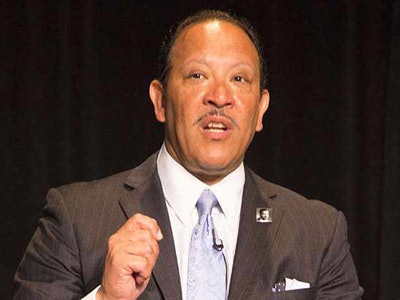WASHINGTON — African-Americans must fight to protect the socioeconomic and political gains made under the Obama administration and vigorously oppose imminent threats from the Trump administration to turn back the clock, the longtime leader of the National Urban League said Tuesday.
“It would be difficult to pinpoint any moment in recent history where so much economic and social progress stood at such dire risk as it does today,” Marc Morial, president of the National Urban League, said at the organization’s D.C. bureau.
 Marc Morial is president of the National Urban League.
Marc Morial is president of the National Urban League.He said that, while the investments in “vital programs” were protected under the proposed fiscal 2017 budget, “we must remain vigilant because the ‘skinny budget’ for next year includes these massive proposed cuts for vital services.”
Among other things, Morial stressed the need to remain vigilant against discriminatory voter laws and work to protect consent decrees that monitor police departments for discriminatory practices — particularly as the Department of Justice under the Trump administration reversed course and stopped fighting a discriminatory voter ID law in Texas — as the Obama administration had done — and to “review” various consent decrees.
Morial made his remarks as the National Urban League released the 41st edition of its annual State of Black America report. The report states that African-Americans have an average of 72.3 percent in “equality” across a range of categories that include health, economics and education — down 0.1 percentage points from last year.
Morial hailed the report as a go-to resource for a series of statistics that range from unemployment and college attainment rates to traffic stops by race.
He also highlighted the report’s key policy prescription — implementation of the organization’s “Main St. Marshall Plan,” — which is a $4 trillion, 10-year investment in America’s infrastructure and in education and job training.
Dr. Bernard E. Anderson, Whitney M. Young, Jr. Professor Emeritus at The Wharton School at the University of Pennsylvania, and a presidential economic adviser for the National Urban League, said the plan has the potential to eradicate racial equality.
“Once implemented, the Main Street Marshall Plan can open new and increased avenues for African Americans to further enjoy ‘life, liberty, and the pursuit of happiness,’” Anderson wrote in an article titled, “Crippling Progress: Can The Main Street Marshall Plan Survive Trump?,” which was released in conjunction with the State of Black America report.
Among other things, the plan calls for a “comprehensive infrastructure initiative” to rebuild the nation’s roads, bridges, rails, as well as other things not commonly thought of when it comes to infrastructure.
“We need to go further than that and ensure that any infrastructure plan also covers school buildings, community facilities, community health centers, community centers, broadband,” Morial said.
But the Trump administration’s proposed budget for fiscal 2018 “would be devastating for the Main Street Marshall Plan,” according to Anderson.
“It would do little to accelerate economic growth, reduce long-term unemployment, expand economic opportunity for minority group workers, or ease the burden on low-income families,” the article states of the Trump budget for 2018, which he noted would increase defense spending by $54 billion and offset the increase by taking money from other “vital agencies.”
Anderson stated that the Marshall Plan can only “fully realize” its goals and objectives if certain conditions are met, such as unemployment rates of less than 4.4 to 4.7 percent annually; a reduction in income inequality; and targeted community revitalization spending.
“The reality is that the Main Street Marshall Plan will be implemented within the context of national fiscal and monetary policies that undergird the U.S. economy,” Anderson wrote. But he stated that the fiscal year 2018 budget proposal presented by the Trump White House — which would increase defense spending by $54 billion and offset the increase by taking money from other “vital agencies,” is “vastly misaligned with the goals and objectives of the Main Street Marshall Plan.”
Asked if he had any support from members of Congress for the Marshall Plan, Morial stated that there are a members of Congress who support certain components of the plan, particularly its emphasis on rebuilding infrastructure. He said a large delegation of Urban League members planned to present the plan to members of Congress this week in an effort to garner more Congressional support.
While it is unclear how much support the Marshall Plan may get on Capitol Hill, Anderson said the proposed Trump budget — which he said skews most tax cuts toward the rich and restrains capital formation for small businesses — isn’t likely to find much support.
“If there is a saving grace, it is that the Trump budget is not likely to be adopted by Congress,” Anderson wrote. “Many of the budget’s proposals are likely to run into stiff resistance from lawmakers on Capitol Hill — including Republicans.
“Some of the budget proposals clash with the economic interests of voters in red-state congressional districts that voted for Donald Trump.”
Anderson wrote further that the proposed budget “threatens to truncate the modest, but steady progress the economy has made over the last eight years, and would make the struggle to erase racial inequality increasingly difficult.”
“In that sense, the budget proposal is not only detrimental to African Americans,” Anderson wrote, “but to the economic interests of all Americans.”
Jamaal Abdul-Alim can be reached at [email protected] or follow him on Twitter @dwriter360.





















